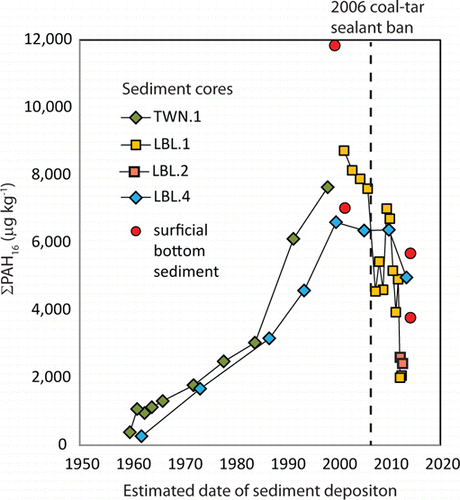Ban on pavement sealant lowered levels of potentially harmful compounds in lake

In 2006, Austin, Texas, became the first city in the country to ban a commonly used pavement sealant over concerns that it was a major source of cancer-causing compounds in the environment. Eight years later, the city's action seems to have made a big dent in the targeted compounds' levels—researchers now report that the concentrations have dropped significantly. They published their study in the ACS journal Environmental Science & Technology.
Peter C. Van Metre and Barbara J. Mahler point out that in 2005, researchers figured out that pavement sealants made from coal tar were contributing high levels of polycyclic aromatic hydrocarbons (PAHs) to the environment. This is a serious public concern because studies have shown that PAHs cause cancer in animals, and they likely impact human health as well. In the meantime, U.S. developers and residents are still coating driveways and parking lots with millions of gallons of coal-tar sealants every year. Some local and state governments have banned coal-tar sealants, but no one knew what kind of effect the interdictions were having. To find out, Mahler and Van Metre's team decided to investigate whether Austin's ban was in fact lowering local PAH levels.
They sampled the mud at the bottom of Lady Bird Lake, which receives much of the water running off Austin's streets and parking lots. Using historic data and their new analyses, the scientists found that after a 40-year rise in PAHs in the lake's sediments, the ban knocked levels down by about half. Concentrations are still continuing to decline, they say.
More information: "PAH Concentrations in Lake Sediment Decline Following Ban on Coal-Tar-Based Pavement Sealants in Austin, Texas" Environ. Sci. Technol., Article ASAP. DOI: 10.1021/es405691q
Journal information: Environmental Science & Technology
Provided by American Chemical Society


















